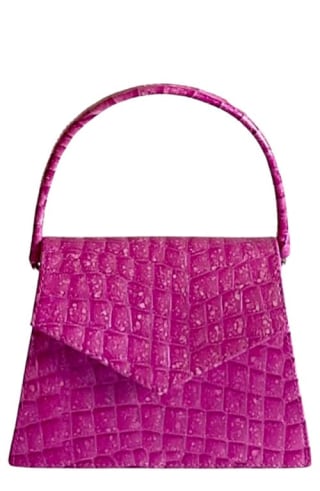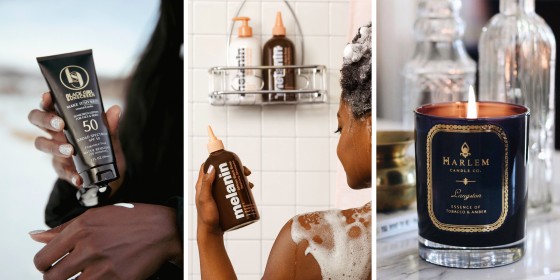
How Fifteen Percent Pledge supports Black-owned businesses
We broke down how shoppers can join the Fifteen Percent Pledge alongside retailers, and which companies have committed to it since it was founded.




Sephora joined the Fifteen Percent Pledge in June 2020, and Sephora Canada made the commitment in May 2021. According to the retailer, it carried eight Black-owned brands across categories like skin care, hair care and makeup when it first committed to the pledge. Now, Sephora says it carries over a dozen Black-owned brands, and in fall 2021, the retailer said it achieved the 15% benchmark in the hair care category. You can browse all of the Black-owned brands Sephora carries on its site.
Melanin Haircare is a Black-owned hair care line, available at Sephora. Their African Black Soap Reviving Shampoo is a clarifying product that the brand says soothes and calms the scalp. The shampoo is formulated for all hair types and enriched with moisturizing ingredients like cocoa and shea butters.
Macy’s joined the Fifteen Percent Pledge in November 2020. Since making the commitment, the retailer says it now carries five times the number of Black-owned brands compared to 2020. You can browse all of the Black-owned brands Macy’s carries on its site.
Harlem Candle Co. is one of the many Black-owned home goods brands Macy’s carries. The brand offers candles in a variety of fragrances, including Speakeasy, which Harlem Candle Co. says includes hints of palo santo (a tree) and bourbon scents. This candle also comes in a version that has a 22K gold decoration on the outside of the glass.
Rent the Runway joined the Fifteen Percent Pledge in June 2020. In addition to dedicating 15% of its shelf space to Black designers, Rent the Runway committed to ensuring that a minimum of 15% of its freelance creative talent like stylists, photographers and models are Black individuals. You can browse all the apparel from Black designers Rent the Runway carries on its site.
You can find Autumn Adeigbo apparel at Rent the Runway, including this bralette. It’s made from Italian merino wool and features a scoop neckline. The sleeveless bralette has a black geometric design printed on it and is available in sizes ranging from Extra Small to Large.
Ulta joined the Fifteen Percent Pledge in May 2021. As of 2022, the retailer said it was about halfway toward reaching its goal of 15% percent representation on shelves. You can shop all of the Black-owned and founded brands Ulta carries on its site.
Black Girl Sunscreen is sold at Ulta. Its Moisturizing Sunscreen Lotion offers SPF 30 protection and has a sheer formula to prevent a white-cast from being left behind, the brand says. The sunscreen is also infused with jojoba and cacao avocado and is water-resistant for up to 80 minutes, according to Black Girl Sunscreen.
West Elm joined the Fifteen Percent Pledge in July 2020. As part of its commitment, the retailer vowed to dedicate 15% of West Elm LOCAL shelf space to Black-owned businesses — today, the retailer says Black-owned businesses make up 18% of its West Elm LOCAL assortment. You can shop Black-owned brands West Elm carries on its site.
Estelle Colored Glass products are sold at West Elm. Available as a set of six, the Stemless Wine Glass comes in a variety of colors like Fuchsia, Lavender, Yellow and more. Each glass can hold 13.5 fluid ounces, according to the brand, and must be hand-washed.
Black spending power — which refers to how much money a group has to buy products and services — reached $1.6 trillion in 2021, and it’s projected to grow to $1.8 trillion by 2024. John Harmon, founder and president of the African American Chamber of Commerce of New Jersey, told us this means that the Black community “contributes greatly to mainstream businesses large and small.” He sees retailers taking the Fifteen Percent Pledge as a form of reciprocity: Black individuals shop at retailers’ stores, and in return, retailers support the Black community by investing in Black-owned businesses.
“They’re paying back an investment that they owe,” said Larry Ivory, president and CEO of the Illinois Black Chamber of Commerce. “We have to see investing in Black businesses kind of like reparations in terms of giving people a fair opportunity to compete in a capitalist society without enormous disadvantage.”
Additionally, the Fifteen Percent Pledge offers a directory of Black-owned and Indigenous-owned brands on its website called the Business Equity Community, which is sponsored by Google Shopping. The organization helps these businesses grow and create relationships with retailers that have taken the pledge to get their products on shelves. Harmon said this type of support from the Fifteen Percent Pledge can be “potentially transformational” for Black-owned businesses, many of which he noted are first-generation companies.
Ivory said that by helping businesses form partnerships with retailers, the Fifteen Percent Pledge is eliminating the opportunity barrier many Black-owned businesses face when it comes to expanding their companies. The Fifteen Percent Pledge estimates that it shifted almost $10 billion of revenue to Black-owned businesses in one year by connecting them with corporate partners. Harmon said this type of investment is like getting these businesses “off the runway and up in the air to a high altitude.”
As the Fifteen Percent Pledge approaches the third anniversary of its founding in June 2023, it’s expanding its reach by launching new initiatives and partnerships that bolster Black-owned businesses and help shoppers discover them.
During the 2022 holiday season, the Fifteen Percent Pledge launched its first physical New York City pop-up shop in collaboration with Citi, allowing customers to browse Black-owned brands in-person. The physical pop-up shop was accompanied by an online store through which shoppers buy from a curated selection of Black brands.
“In feedback channels, we hear that general consumers understand the Fifteen Percent Pledge movement, but the brand-discovery piece is very hard,” Williams-Belfort said. “The pop-up shop and online store are about visibility and making brand discovery easy. It’s giving all consumers — not just Black consumers — an opportunity to get acquainted with Black brands and founders.”
While the physical pop-up shop is now closed, the Fifteen Percent Pledge’s partnership with Citi has continued. The online store, called the Fifteen Shop, is still live through Women’s History Month. Williams-Belfort said data shows that Black women in the U.S. are starting businesses at a higher rate compared to their white counterparts, but don’t get nearly as much financial support, emphasizing how crucial shoppers are to their viability.
In 2023, the Fifteen Percent Pledge also hosted its second annual gala and launched its first ever Achievement Awards, giving out $250,00 in cash grants to Black business owners. “Access to capital is the biggest barrier to entry for Black entrepreneurs,” Williams-Belfort said. “Being that the Pledge is at the center of innovation and thinking about sustainable, tactical ways to close the racial wealth gap, we had to create an opportunity to provide funding to businesses.”
Williams-Belfort said thousands of businesses applied for its Achievement Grants and the general public voted for their favorite brands to narrow down the list to three finalists. 54th Thrones came in first place and received $200,000, a prize sponsored by Google Shopping, Sergio Hudson won $35,000 and Puzzles of Color won $15,000. Williams-Belfort said the Pledge wants to make its Achievement Awards a legacy program and intends to launch a second cycle of the awards.
To date, 29 companies across the U.S., Canada and the United Kingdom have committed to the Fifteen Percent Pledge, including retailers and corporations like Vogue, InStyle and Yelp.
Below is the full list of retailers who have taken the Fifteen Percent Pledge and when they committed. This list will continue to grow — Williams-Belfort said companies are still actively in conversation to join The Pledge. Retailers often commit to increasing the number of Black-owned brands they carry, while brands that exclusively sell their own products — like Victoria’s Secret, for example — may commit to increasing the number of Black suppliers they do business with.
At Select, we work with experts who have specialized knowledge and authority based on relevant training and/or experience. We also take steps to ensure that all expert advice and recommendations are made independently and with no undisclosed financial conflicts of interest.
Catch up on Select's in-depth coverage of personal finance, tech and tools, wellness and more, and follow us on Facebook, Instagram and Twitter to stay up to date.